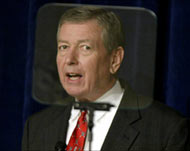Bush: Domestic spying is limited
George Bush, the US president, has defended his domestic spying programme, saying it is limited.

Bush said his decision to let the intelligence community listen to phone calls Americans had with suspected terrorists was lawful and did not result in widespread domestic eavesdropping.
Bush, whose decision will be discussed in congressional hearings on the surveillance, said on Sunday that the programme, run by the ultra-secret National Security Agency (NSA), was limited. He made it clear that he intends to argue that he acted within the law.
“The NSA programme is one that listens to a few numbers,” the president said after visiting 51 wounded soldiers and their families at Brooke Army Medical Centre in San Antonio, Texas.
“In other words, the enemy is calling somebody and we want to know who they’re calling and why,” he said before returning to Washington.
His order gave the NSA permission to eavesdrop without a warrant on communications between suspected terrorists overseas and people inside the United States.
“The fact that somebody leaked this programme causes great harm to the United States,” Bush said.
 |
|
Ashcroft was told about concerns |
Senator Charles Schumer, a New York Democrat, appearing on Fox News Sunday, said the Justice Department investigation should explore the motivation of the person who leaked the information.
“Was this somebody who had an ill purpose, trying to hurt the United States?” Schumer asked. “Or might it have been someone in the department who felt that this was wrong, legally wrong, that the law was being violated?”
Resistance
Bush did not answer a reporter’s question about whether he was aware of any resistance to the programme at high levels of his administration and how that might have influenced his decision to approve it.
James Comey, a deputy to then-Attorney General John Ashcroft, was concerned with the programme’s legality and oversight, some local media reported.
Administration officials then went to Ashcroft to gain his approval, but it was unclear whether he gave it, The New York Times newspaper reported.
Neither Comey nor Ashcroft would comment on the meeting. Trent Duffy, a White House spokesman, declined on Sunday to answer questions about the administration’s internal discussions.
Administration officials have said the programme performs wiretaps only when there is a reasonable basis to believe that the conversation includes a suspected terrorist and that one party is overseas.
|
“I can say that if somebody from al-Qaida is calling you, we would like to know why” George Bush, |
“This is a limited programme designed to prevent attacks on the United States of America and, I repeat, limited,” Bush said. “I think most Americans understand the need to find out what the enemy’s thinking.”
Privacy violation
Asked what he would say to those who claim the eavesdropping violates privacy, Bush said: “I can say that if somebody from al-Qaida is calling you, we would like to know why… This programme is conscious of people’s civil liberties, as am I.”
His order, however, bypassed the Foreign Intelligence Surveillance Court, a little-known panel of 11 federal judges that approves wiretaps and searches in the most sensitive terrorism and espionage cases.
The president denied misleading the public during a 2004 appearance in support of the Patriot Act when he said: “Any time you hear the United States government talking about wiretap, it requires a court order.
“Nothing has changed, by the way. When we’re talking about chasing down terrorists, we’re talking about getting a court order before we do so.”
Bush said his comments – two years after approving the NSA programme – applied to roving wiretaps the Patriot Act allowed for law enforcement, not the kind of eavesdropping the agency did to collect intelligence.